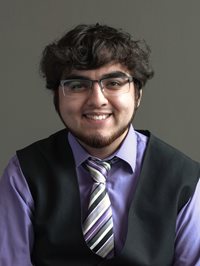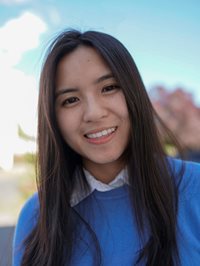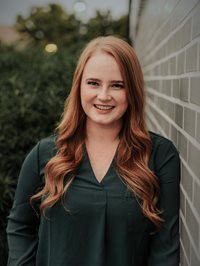Applied Computing Careers
By combining your computer science education with your Second Discipline of study, your career opportunities are endless! This page contains recent job titles and testimonials from our graduates.
- Graduate job titles
- Jesus Govela – Class of 2019
- Christine Nguyen – Class of 2018
- Eleanor Wort – Class of 2015
Graduate job titles
Recent examples of job titles and companies of our graduates include:
- Collaboratory Space Manager, Office of Connected Learning, UW Bothell
- Senior Data Analyst, MindBodyGreen
- App Assure Program Manager, Microsoft
- Software Development Engineer, Amazon Web Services
- Technical Recruiter (Engineering), Aerotek
- Software Engineer, AT&T
- Full Stack Web Developer, Azula Codes
- Programmer Analyst, Boeing
- Software Engineer, Collabera Inc.
- Software Developer / Co-founder, Entrepreneur
- Developer in Test II, Expeditors
- Technology Teacher, King’s Schools
- Tech Check Team, Kaiser Permanente
- Data Analyst, Point B
- Sr. Project Manager, Technical at T-Mobile
- Tech-X Professional, T-Mobile
- Quality Assurance Tester
- Software Engineer (iOS), Samaritan
- Senior Associate, Operational Logistics, Team Rubicon
- Academic Advisor for Computer Science, University of Washington Bothell
Jesus Govela — Class of 2019

How’s life?
It’s going pretty well! I have recently been hired as the Space Manager for the UW Bothell Collaboratory (formerly known as the Makerspace). 澳门赌场 Collaboratory is a space where students, staff, and faculty can collaborate and work on projects using our workshop tools and resources. After graduating with my degree in Applied Computing and Business Administration minor, I stayed involved with a few colleagues who were in the process of starting a new club, which eventually led to me working in the Makerspace and now taking on the lead role. I work with and lead my team of student staff to keep the space well-maintained, clean, inviting, and safe.
I also work on a team with other professional staff under the Office of Connected Learning, which includes Global Initiatives, Undergraduate Research, and Community Based Learning and Research. Together we work on collective marketing and events, develop a strategic plan and collective goals, and also provide support for each other in general. I always find it interesting to learn more about how the campus operates and how these student-facing programs are created.
Why did you choose Applied Computing?
I originally wanted to go into the Computer Science & Software Engineering (CSSE) major, but not long after I was accepted into the program and started taking the required classes I found that I was getting increasingly frustrated with writing code, and realized I didn’t want to do that for a living. I then started looking for other degree major options when my academic advisor, Ahnya Redman, pointed me towards the Applied Computing major after hearing I had done well in technical writing and was interested in project management. This sounded like a great way to take what I had already done in CSSE and apply it to another field I was interested in. I switched after taking a quarter off to think about it, and started taking more business classes that interested me and would pair well with my other classes in technology and computing.
How have you integrated your second discipline?
Being the manager of a space that works with 3D printing, laser cutting, and other unique technology has me using much of what I learned in both Applied Computing and Business. Some days have me taking apart and finding hardware issues with the machines while also reaching out to and meeting with other staff, professors, and others about potential partnerships. Communicating technical processes and explaining technical terms in a way everyone can understand is also a skill that I’ve been applying in my work. This role is the first one I’ve had in any sort of professional leadership position, so I’ve been able to work on my leadership and team building skills a bit too, though I still have much to learn.
How did the degree prepare you for your career?
澳门赌场 Applied Computing degree was a great way to begin thinking about how technology and business intersect and had me thinking of what goes into developing a product or piece of software besides the actual programming component. I now know how important good management is to the success of any team, and how I can be supportive and helpful to those who may have great technical skills, but still require assistance working with and communicating concepts to others. Overall, Applied Computing prepared me for the team-based environment that most jobs have and gave me more opportunity to explore how my career could fit into the tech field while also helping me find what type of work I like to do best.
Christine Nguyen — Class of 2018

How’s life?
Today, I am working as a Senior Data Analyst at MindBodyGreen. I work with data on both the backend and frontend side, which allows me to be the bridge between both users. When working in the backend I get involved with ETL design/development with SQL. On the frontend side, I help other analysts to understand the structure of the data warehouse, so they know how to retrieve the information they need for analysis. I use tools, such as Tableau, to help me automate reporting for business leaders to easily track their KPIs and goals for the company. I leverage data in building forecasting models with Python to predict things like future sales. My role today is centered around data, all in the effort to encourage leadership in making data-driven decisions.
Why did you choose Applied Computing?
I chose Applied Computing because I found it interesting that I could learn many of the same topics as my peers who were in the Computer Science and Software Engineering Major. On top of that, it allowed me to also explore other fields of study, such as business and economics.
How have you integrated your second discipline?
For my job, I mostly analyze sales and marketing data. Business leaders need help with understanding their data and do not have a lot of time to dive deep into the data. My minor has helped me in finding ways to not only understand the context of the analysis, but also how to tell the story to non-technical people. This is important as business leaders need to make decisions, and I can help them to make better decisions by not only diving into the analysis, but also translating the key insights in their language.
How did the degree prepare you for your career?
Although the specific technologies at my job were different than what was taught in school, the degree helped me to build the foundation I needed to easily adapt to learning new tools and breaking down large problems, which put me ahead of the business analysts at my job. I was ahead of my peers who just focused on computer science classes because I took other courses like economics and marketing to help me utilize technology to solve common business problems and eliminate manual processes that companies have.
Eleanor Wort — Class of 2015

How’s life?
Life is great! I’ve been at Microsoft for six and a half years after graduating from UWB with my Applied Computing degree and Business Administration minor. I’ve had a few different roles within the company starting with an Application Development Project Manager and have now moved into a Program Management role. As a Program Manager, I help manage a global support team that assists customers with application compatibility issues they may face when upgrading to the latest version of Microsoft technology.
This position requires me to understand both business and technical jargon used by customers and developers as I communicate customer bugs and needs directly to the product engineering team. I also conduct internal team training for new products, present our program at conferences, and write blogs and develop docs for external customers. Having the ability to understand technical components of Microsoft products while also translating that to a business conversation has helped me grow quickly in my career!
Why did you choose Applied Computing?
I originally started out as a Computer Science & Software Engineering (CSSE) major and quickly discovered I didn’t love writing code. While I’ve always been passionate about technology, writing code was not the career path I wanted. After having a Technical Writing course with Dr. Laurie Anderson at UWB, I confided in her to figure out what the right career path was for me. I knew I enjoyed her Technical Writing class and thought I might prefer a project management path instead of the more technical development side.
Dr. Anderson told me about the Applied Computing major and I realized this would also allow me to study another passion of mine – business! I quickly switched to the program and was excited to design my own education. I chose business classes related to my interests and incorporated those learnings into my computer science classes as well to build that project management focus.
How have you integrated your second discipline?
Being a Program Manager, business and technology are my two key focuses. I get the opportunity to integrate these two every day. I use my business management skills to think through the business strategy for the program and utilize the business skills to conduct technical trainings and present at tech conferences. Understanding how a business functions from staffing, to budget, to team building has helped me immensely. I enjoyed the business side of tech so much that I chose to pursue a Master’s Degree in Organizational Leadership so I could dive deeper into management and build strong teams and organizations in the tech world!
How did the degree prepare you for your career?
Having the opportunity to focus on two different degree areas through the Applied Computing degree really helped prepare me for the “real world”. I had a base understanding of both business and technology which was the building block I needed for even more growth once I entered Microsoft. 澳门赌场 professors in the Applied Computing degree would discuss real world scenarios that helped me understand more about what I would be exposed to outside of college and understand the language and terminology used by engineering teams. I thoroughly enjoyed my time at UWB and I know I would not be where I am at Microsoft today without the support and guidance I received while at UWB!